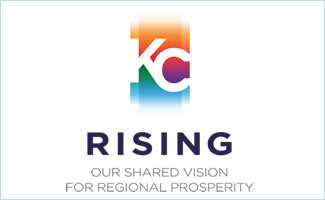
While many of our peer cities have bounced back from the Great Recession, the Kansas City region is not keeping up – and the gap is growing.
Our region’s job growth and economic output is not keeping pace with peer cities. Median household income is falling, and adjusted for inflation is now at levels not seen since the 1980s. Local demand for educated workers is exceeding supply, especially in STEM-related fields. Net exports are a declining share of the region’s economy, in part due to insufficient commercialization and firm growth in innovation sectors and industries.
KC Rising is the proactive response to this situation and involves leaders from the business, civic, philanthropic, education and local government communities. The Kansas City metro business community has to come together to create a sustainable, strategic vision for the economic future of our entire KC region. KC Rising is a shared vision for regional prosperity with an overall goal of being in the Top 10 of our peer metros in Quality Jobs, Gross Metropolitan Product, and Median Household Income.
The effort is guided by a Steering Committee chaired by Doug Girod, MD, Executive Vice Chancellor KU Medical Center and Scott Smith, former CEO, HNTB Infrastructure. Support for the initiative is provided by the Civic Council of Greater Kansas City, Kansas City Area Development Council, and Mid-America Regional Council.
Three planning groups comprised of business and civic leadership from across the two-state region are focused on Globally Competitive Sectors, Innovation & Entrepreneurship and Human Capital. When KC Rising is successful, the region will benefit through the creation of:
• A regional ecosystem that allows individual companies to increase their traded goods and services.
• A cycle of prosperity where each industry is dependent on the success of the other.
• Insurance that the KC region continues to be a place of choice to live and do business.
• Today’s business leadership focused on the next generation’s opportunities and successes.
KC Rising will be rolling out initial recommendations from the three working groups at the end of February 2016.